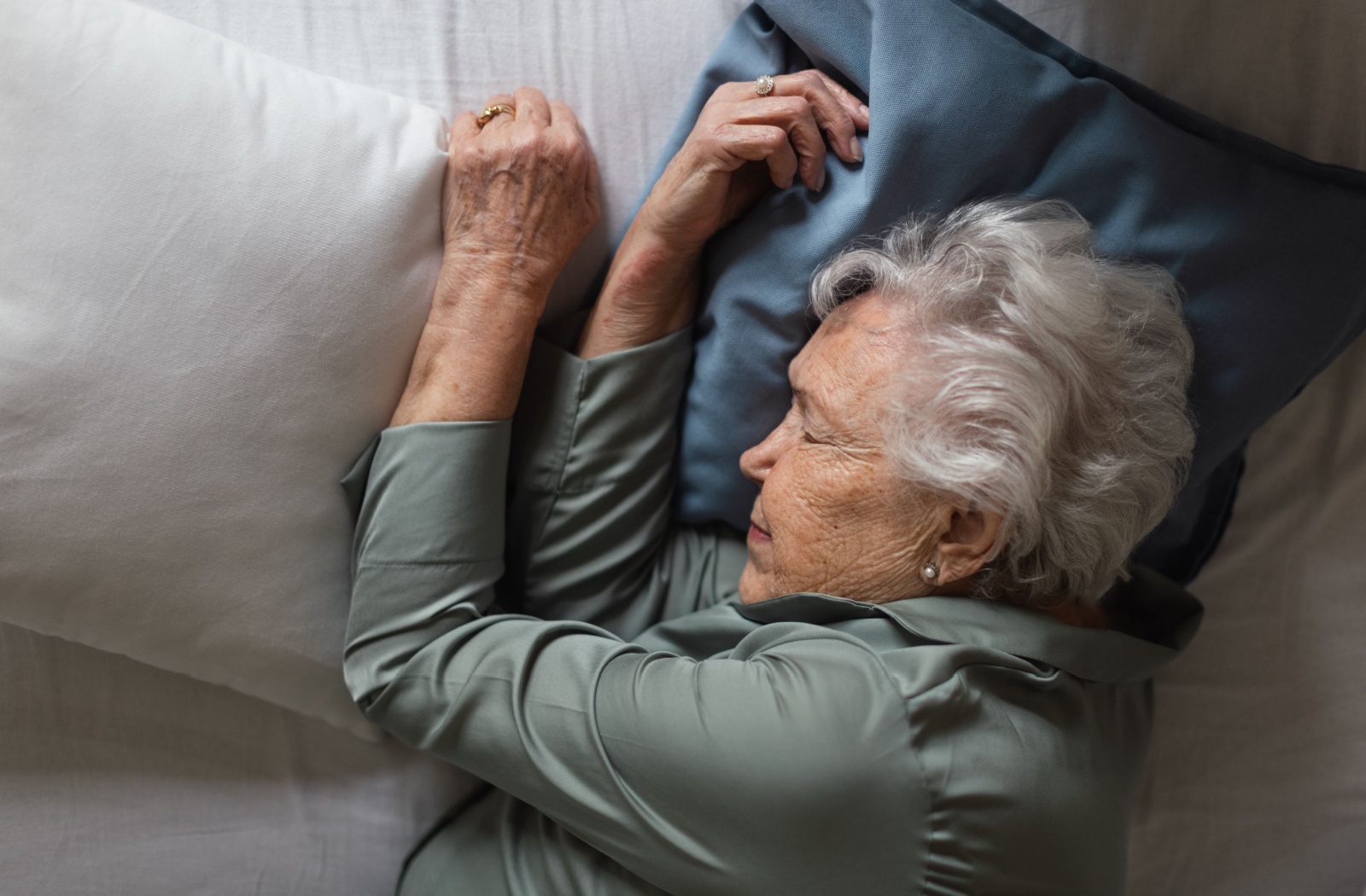Sleep plays a vital role in maintaining overall health—especially as we age. But for many older adults, restful nights become increasingly elusive. If your loved one is struggling to fall or stay asleep, you’re not alone.
Yes, it’s normal for seniors to have more difficulty sleeping. However, ongoing issues may signal something more specific that needs attention. Understanding what’s behind these sleep disruptions can help you take meaningful steps to improve your loved one’s rest and overall well-being.
Why Do Seniors Struggle with Sleep?
Aging naturally affects how we sleep. It’s not uncommon for seniors to wake up more frequently during the night or rise earlier in the morning. But in many cases, sleep trouble goes beyond normal changes and may signal other issues worth exploring.
Let’s take a closer look at the most common causes of sleep disturbances in older adults.
Common Reasons Seniors Experience Sleep Problems
1. Medical Conditions
Ongoing health issues can make it hard for seniors to relax or stay comfortable through the night. Common sleep-disrupting conditions include:
- Sleep apnea – Causes pauses in breathing during sleep.
- Arthritis or chronic pain – Makes it hard to get comfortable.
- Heart disease – Can cause shortness of breath or discomfort.
- Anxiety or depression – Mental health issues often disrupt sleep.
- Restless Leg Syndrome (RLS) – Creates strong urges to move the legs.
- Nocturia – Frequent nighttime urination.
- Dementia or Alzheimer’s – Can cause confusion and sleep-wake cycle changes.
These conditions may affect sleep directly or cause symptoms—like pain or restlessness—that make falling asleep difficult.
2. Medication Side Effects
Many seniors take multiple medications, and some of these can interfere with sleep. Common sleep-disrupting medications include:
- Beta-blockers – May reduce melatonin production.
- Antidepressants – Some can cause alertness or vivid dreams.
- Steroids – Often lead to restlessness.
- Diuretics – Increase bathroom trips at night.
- Stimulants or inhalers – Can be energizing if taken too late in the day.
If sleep problems begin after starting a medication, talk to a doctor about possible adjustments.
3. Natural Changes in Sleep Patterns
As we age, our sleep structure changes. Seniors often experience:
- Lighter sleep – More time in light sleep, less in deep sleep.
- Frequent awakenings – More likely to wake during the night.
- Earlier bedtimes and wake-ups – Sleep-wake cycles shift earlier.
- Lower melatonin levels – The body produces less of this sleep hormone.
These changes are normal but can lead to feelings of tiredness during the day.
4. Environmental Disruptions
A person’s sleep environment has a big impact on their sleep quality—especially for older adults who may be more sensitive to surroundings. Common issues include:
- Noise – Pets, traffic, or TVs can cause interruptions.
- Temperature – Being too hot or too cold can disrupt comfort.
- Light – Light from windows or electronics may make it harder to fall asleep.
- Uncomfortable bedding – Mattresses or pillows that don’t provide proper support.
- Bed-sharing – Partners or pets can unintentionally disturb sleep.
A calm, dark, and quiet bedroom often helps improve sleep quality.
5. Lack of Daily Activity or Routine
A slower pace of life can sometimes lead to poor sleep at night. Without structure or movement during the day, the body may not feel tired at bedtime.
- Limited exercise – Less physical activity means less need for rest.
- Inconsistent schedules – Irregular sleep times confuse the body’s internal clock.
- Little exposure to daylight – Natural light helps regulate sleep rhythms.
Adding light physical activity and daily routines can support better sleep patterns.
6. Diet & Evening Habits
What seniors eat and drink—especially in the evening—can have a big effect on their sleep.
- Caffeine – Found in coffee, tea, chocolate, and some medications.
- Alcohol – May help at first, but often disrupts deep sleep.
- Heavy or spicy meals – Can cause indigestion or discomfort.
- Too little water – Dehydration can cause muscle cramps or headaches.
Small changes to evening habits can reduce nighttime disruptions and promote restful sleep.

How to Improve Sleep for Seniors
The good news? Small changes can make a big difference when it comes to promoting better sleep for older adults. Here are some practical strategies:
Establish a Consistent Bedtime Routine
Encourage relaxing evening habits—like reading, listening to soft music, or taking a warm bath. Going to bed and waking up at the same time each day also helps regulate the body’s internal clock.
Limit Screen Time Before Bed
Blue light from phones, TVs, or tablets can interfere with melatonin production. Try to power down devices at least an hour before bedtime.
Encourage Daily Physical Activity
Gentle exercise during the day can improve sleep quality at night. Activities like walking, stretching, or chair yoga are great options. Just be sure to avoid vigorous activity too close to bedtime.
Try Cognitive Behavioral Therapy for Insomnia (CBT-I)
CBT-I is a proven, medication-free approach to addressing chronic sleep issues. It helps individuals identify and change thoughts and behaviors that interfere with sleep.
Create a Sleep-Friendly Environment
A calming, comfortable space is essential for restful sleep. Consider:
- Blackout curtains to block light
- A white noise machine to mask sound
- Cooling the room slightly
- Investing in a supportive mattress and pillows
- Keeping electronics out of the bedroom
Why Sleep Matters for Seniors
Poor sleep isn’t just about feeling tired the next day. It can also affect memory, mood, immune health, and even the ability to stay independent. That’s why it’s so important to take sleep issues seriously and support your loved one in creating healthier habits.
Discover a Better Night’s Rest
Supporting restful, rejuvenating sleep is just one of the ways we care for our residents at All American Assisted Living at Kingston. With personalized care, engaging activities, and a peaceful environment, we help seniors enjoy the comfort and security they deserve.Ready to learn more? Schedule a tour today and see how our community can support your loved one’s wellness—day and night.



